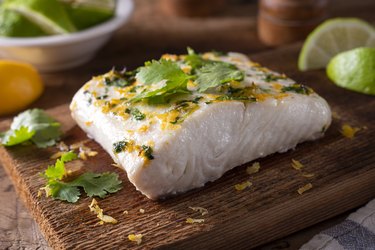
High-protein, low-calorie foods are a great way to pack your diet with the nutrients you need to keep you satisfied. They are also a great option for those trying to lose weight and preserve lean muscle mass.
"Protein is what helps build and repair muscle, so it's good to opt for lean sources of protein," says Nijya Noble, RDN, registered dietitian and founder of NK Fitness and Nutrition.
Video of the Day
Video of the Day
On top of that, these are versatile foods that can be cooked or prepared in different ways, so your tastebuds won't get bored.
How Much Protein Do You Need for Weight Loss?
The recommended daily allowance for protein is 0.8 grams per kilogram of body weight, but it may be beneficial to eat more than that when you're restricting calories for weight loss. A June 2015 study in The American Journal of Clinical Nutrition suggests aiming for 1.2 to 1.6 grams of protein per kilogram of body weight in this case.
For example, if you weigh 200 pounds (about 91 kilograms), you may want to aim for somewhere between 109 and 145 grams of protein per day.
1. Tempeh: 34g Protein, 319 Calories

For another meatless option, tempeh is one of the best low-calorie, plant-based protein sources, with 34 grams of protein and 319 calories per 1 cup serving, per the USDA.
Tempeh is great in stir fry dishes, in wraps or added to sandwiches.
2. Chicken Breast: 27g Protein, 160 Calories
Chicken breast is a high-protein classic that can be prepared in several ways. It has 27 grams of protein and 160 calories per 4-ounce serving, according to the USDA, and can be added to nearly any dish for a lean protein source.
You can count on chicken breast for more than just high protein content. Other health benefits of chicken include important micronutrients like B vitamins and selenium — a vitamin essential for metabolism and thyroid function, per the Harvard T.H. Chan School of Public Health.
3. Cottage Cheese: 25g Protein, 221 Calories
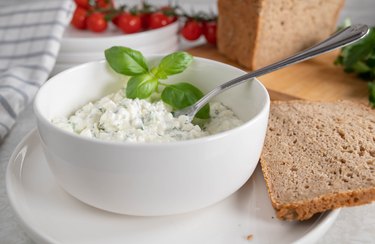
A 1-cup serving of small curd cottage cheese has 25 grams of protein and 221 calories, per the USDA.
Cottage cheese is also a great source of the amino acid leucine, with nearly 3 grams per 1-cup serving. Leucine is an important amino acid for building muscle, according to the Cleveland Clinic.
4. Halibut: 22g Protein, 94 Calories
Halibut is a low-fat, high-protein seafood with only 1.61 grams of fat and 22.54 grams of protein per 3-ounce serving, per the USDA. It's also low in calories, with 94 calories per serving.
Halibut can be cooked in many different ways, including broiled, baked, grilled or pan-fried.
5. Protein Powder: 22g Protein, 100 Calories
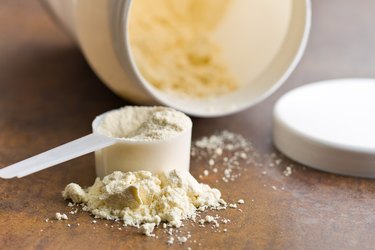
Protein powder is a popular supplement that can increase your daily protein intake. There are many different kinds of protein powder, including whey, casein and plant-based options.
"The kind of protein powder you use depends on your diet," Noble says.
She suggests selecting a protein powder that has 20 to 30 grams of protein per serving.
One scoop of whey protein powder (about 1 ounce) has 22 grams of protein and 100 calories, per the USDA.
6. Shrimp: 21g Protein, 100 Calories
Shrimp has 21 grams of protein and 100 calories per 3-ounce serving, per the USDA.
It's an ideal low-fat, high-protein food option that can be used in salads, pasta dishes and stir fry dishes.
Among the other health benefits of shrimp? It's packed with nutrients that support your brain health.
7. Canned Tuna: 20g Protein, 90 Calories
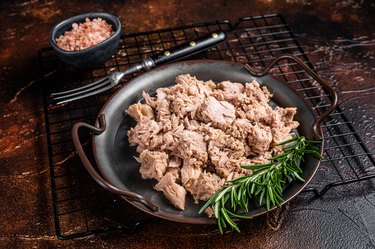
Canned tuna has 20 grams of protein and 90 calories in each can, per the USDA.
This protein option is extremely versatile and can be used for a salad, sandwiches and dips.
The health benefits of tuna are also impressive, as it's linked to heart health, brain health, healthy vision and strong bones.
8. Edamame: 19g Protein, 188 Calories
Edamame is an excellent source of protein and fiber, providing nearly 19 grams of protein, 188 calories and 29 percent of your daily fiber needs in a single cooked cup, per the USDA.
Other impressive nutrients in edamame include magnesium, zinc, potassium, iron and vitamin K.
9. Salmon: 17g Protein, 121 Calories
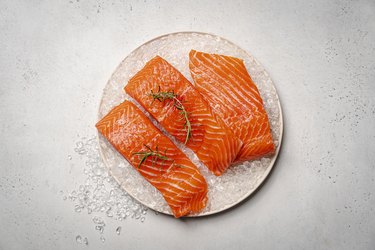
This seafood option really delivers, with 17 grams of protein and 121 calories per 3-ounce serving, per the USDA.
Salmon is also packed with omega-3s and B vitamins, which help support bone and heart health.
10. Oat Bran: 16g Protein, 231 Calories
Oat bran has 16 grams of protein and 231 calories per cup, per the USDA.
You can prepare oat bran the same way you would make oatmeal, and add toppings like fruit, nuts or peanut butter, or make a savory oat recipe.
"Homemade oatmeal is a great breakfast option and much better than pre-packaged, sugary oatmeal packets," Noble says.
Oat bran is also a good source of fiber, with 14.5 grams per cup.
11. 93% Lean Ground Turkey: 16g Protein, 128 Calories
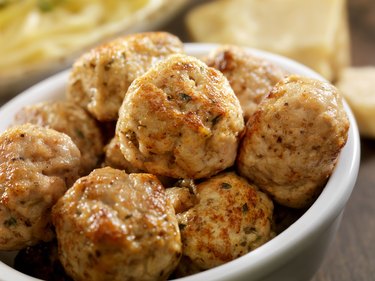
Three ounces of 93 percent lean ground turkey is 128 calories, 16 grams of protein and 7 grams of fat, per the USDA. It can be used to make burgers or meatballs and added to pasta sauce for a low-fat protein source in your meals.
A lean cut of meat means it has minimal fat. To compare, a 3-ounce serving of 85 percent lean ground turkey is 153 calories and 14 grams of protein with nearly 11 grams of fat, per the USDA.
12. Tofu: 15g Protein, 122 Calories
Tofu has 15 grams of protein and 122 calories per 3-ounce serving, per the USDA.
It's basically tasteless, which means you can cook and season it however you like best. Add it to a stir fry or salad, or prepare it extra crispy.
13. Garbanzo Beans: 15g Protein, 269 Calories
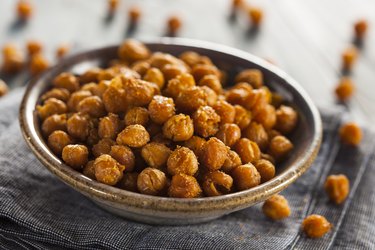
Also known as chickpeas, garbanzo beans have nearly 15 grams of protein and 269 calories in 1 cup cooked, per the USDA.
They're also high in fiber, packing 45 percent of your daily value.
Because of its healthy dose of protein and fiber, this legume is also great for weight loss to keep you full for longer.
14. Greek Yogurt: 13g Protein, 137 Calories
Greek yogurt is a quick source of protein and more nutrient-dense than traditional yogurt because of its higher protein content, per Noble.
Plain Greek yogurt has 13 grams of protein and 137 calories in a 5-ounce serving, according to the USDA.
15. Lentils: 9g Protein, 115 Calories
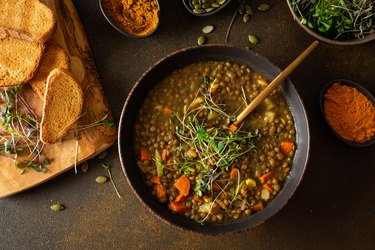
Lentils are a nutrient-packed food with nearly 9 grams of protein and 115 calories per half cup (when cooked), per the USDA.
They also have nearly 8 grams of fiber and are a good source of micronutrients, including iron and zinc.
Just because this is a plant-based protein option, don't be fooled: There are some lentil recipes with more protein than chicken.
16. Black Beans: 9g Protein, 132 Calories
Cooked black beans have close to 9 grams of protein and 132 calories per 100-gram serving (that's about a half cup), per the USDA.
They're a great meatless, high-protein option that can easily be included as a side dish or added to a casserole to give your dish a protein-packed upgrade.
Black beans are also high in fiber, which can help you feel full.
17. Skim Milk: 8g Protein, 83 Calories
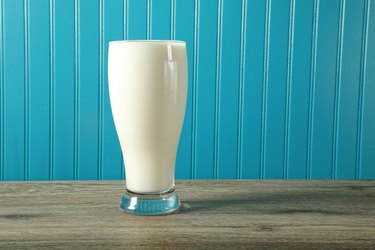
One cup of skim milk has 8 grams of protein and 83 calories, according to the USDA. It's a high-protein option for your cereal, smoothies or a drink on its own.
Compared to other milk choices it has the lowest amount of calories. According to the USDA, 1 cup of 2 percent milk has 122 calories and whole milk has 149 calories, per the USDA.
18. Eggs: 6g Protein, 71 Calories
One large egg provides 6 grams of protein and 71 calories, per the USDA.
Have them hard-boiled for a quick snack, scrambled, over-easy or fried.
The other health benefits of eggs include antioxidants, B vitamins and omega-3s.
High-Protein Snacks
If you're looking for high-protein snacks that can support your weight-loss efforts, Noble suggests focusing on whole foods first. "I like quick things that are easy to mix up and have a wide variety of choices when you're on-the-go," she says.
Here are her top high-protein snack ideas:
- Apple slices with peanut butter
- Hummus and carrots
- A cup of edamame
- Trail mix
- High-protein yogurt
- Cottage cheese with fruit
- Hard-boiled eggs
- Protein shake
- Low-sodium jerky
If you have to pick a pre-packaged option, she suggests staying mindful of the ingredients.
"Protein bars that are high in sugar can be more like candy rather than a nutritious snack," she notes.
Calorie Restriction and Weight Loss
When deciding how you'll reduce your calories to lose weight, it should be a gradual reduction, Noble says.
"Extreme restrictions won't be sustainable or healthy," she explains. "I recommend making small changes first, like adding more protein and whole foods to your plate."
According to the Dietary Guidelines for Americans, the number of calories a person needs each day depends on several factors, including their age, height, weight and level of physical activity.
The average person with a moderate activity level is advised to consume between 1,800 to 2,000 calories a day. But if you're a highly active person, you need to increase that number to ensure your body gets the energy it needs.
Eating a high-protein diet is a great way to ensure you're getting the nutrients you need for your daily activities, per Noble. If your goal is to cut calories, then consuming the foods with the highest levels of protein and the lowest number of calories will make it easier to get leaner without feeling hungry or deprived.
- Journal of Research in Medical Sciences: “Weight Loss Maintenance: A Review on Dietary Related Strategies”
- Obesity: "A High‐Protein Breakfast Prevents Body Fat Gain, Through Reductions in Daily Intake and Hunger, in 'Breakfast Skipping' Adolescents"
- USDA: “Fish, Salmon, Atlantic, Wild, Raw”
- USDA: “Broccoli, Raw”
- Journal of Nutrition and Metabolism: “Measuring Outcomes in Adult Weight Loss Studies That Include Diet and Physical Activity: A Systematic Review”
- Better Health Channel: “Energy in Food (Kilojoules and Calories)”
- USDA: “How Many Calories Are in One Gram of Fat, Carbohydrate, or Protein?”
- Mayo Clinic: “Whey Protein”
- Journal of Dietary Supplements: “Protein Supplements: Pros and Cons.”
- USDA: “Yogurt, Greek, Plain, Lowfat”
- USDA: “Low Fat Milk”
- USDA: "Cottage Cheese"
- The American Journal of Clinical Nutrition: "The role of protein in weight loss and maintenance"
- Harvard T.H. Chan School of Public Health: Nutrition Source: "Selenium"
- United States Department of Agriculture: "Dietary Guidelines for Americans 2020-2025"